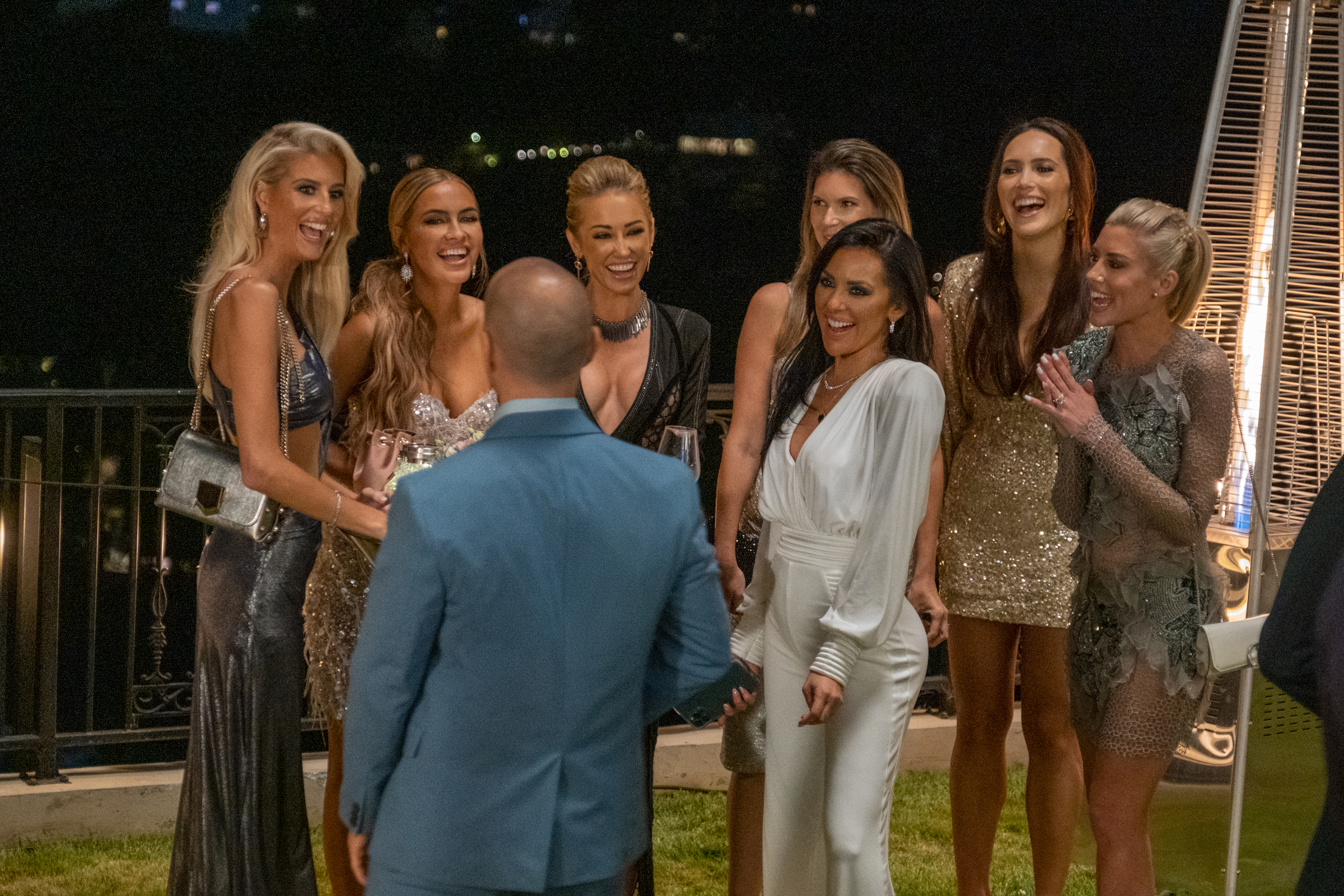There is something endlessly enticing about watching real estate shows featuring multi-million dollar mansions. The imported marble countertops, the elevators, the infinity pools with a view of the city—it’s so unattainable for the average person that watching it feels more like a fantasy than reality show. Therein lies the appeal of Selling Sunset, the Netflix docusoap following a group of luxury realtors at the Oppenheim Group selling some of the ritziest homes in Los Angeles. Of course, there is interpersonal drama, too. With its fourth season premiering on Nov. 24, Selling Sunset will once again welcome us into the office of the Oppenheim Group and its tall, beautiful real estate agents selling huge, beautiful homes.
The show’s heavy focus on the drama between the realtors always prompts questions from viewers on how real Selling Sunset actually is: Are these women actually licensed realtors? Do they really work in that office? And who is actually buying these houses?
Whether you’re Team Chrishell, Team Christine, or just vibing with Romain, we have some answers for you about how the glitzy world of reality TV real estate actually works.

The Oppenheim Group actually sells every house sold on the show
According to Jason Oppenheim, president and founder of the Oppenheim Group, every house and property that is sold on Selling Sunset has been sold by the Oppenheim Group in real life. Viewers have questioned whether it’s possible for these sales to be real when the open house showings often feel staged for the drama.
“The Oppenheim Group has sold every house that is featured as a sale on the show,” Oppenheim tells TIME. “Sometimes agents work together on the sales.”
The Oppenheim Group lists more than 30 agents on their website, but only a handful of them appear on Selling Sunset, so it’s possible that when one agent is showing a listing on TV, they are sharing that listing with another agent who works off-screen.
In the finale of season one, for example, agent Mary Fitzgerald is holding her wedding at one of her listings. (What multi-million dollar house wouldn’t be suitable as a wedding venue?) Being the hard worker that she is, Mary shows the house to a client on her wedding day, while she’s in the middle of getting her hair done. The client, who’s not shown onscreen, is a “big music producer,” Mary says. She ultimately ends up making the sale, and gleefully shares that she sold her wedding venue on her wedding day.
While it’s unclear whether or not parts of that scene were exaggerated for the camera, Mary really did sell the house, a $9.2 million mansion in Los Angeles, to its current owner, the music producer Benny Blanco. The client selling the house was Sean Rad, one of the cofounders of Tinder. None of this client information was divulged on the show, but as celebrity home-buying news is its own beat in the Hollywood gossip world, the fact of this kind of sale is easy to find.
All the agents on Selling Sunset are actually licensed realtors

All of the main cast members on Selling Sunset are in fact registered realtors, per California’s Department of Real Estate, which publicly lists registered real estate agents in the state. It’s kind of like when you see a doctor on one of those shows about botched plastic surgery. It might not be your taste, but what they’re doing would be illegal without a license.
The cast has had to address questions over their authenticity publicly, a few times, including after Chrissy Teigen tweeted her doubts about whether or not the cast members are real agents. “I will say, I look at LA real estate a lot and have never seen any of these people lol [neither] have our agents, who I have obsessively asked,” wrote Teigen.
That Selling Sunset is created by Adam DiVello, who also created docusoap classics Laguna Beach and The Hills, adds fuel to the speculative fire. In the now infamous final shot of The Hills series finale, star Brody Jenner is seen waving goodbye on a street in front of the Hollywood sign, before the shot pulls out to reveal he is merely standing on a film set with a large camera crew—hinting at the artificiality of the show.
After Teigen’s tweets, several cast members chimed in to defend themselves and their colleagues. “Any insinuation that the agents on our show are not experienced, successful, or licensed, evidences a complete disregard for the facts,” Oppenheim said in a statement to People in 2020. “Even a superficial investigation would identify previous team photos, hundreds of millions in transacted sales, and more than 50 years of combined licensed real estate experience from these agents.”
Selling Sunset always touts Mary Fitzgerald as the most experienced agent of the group, and the records show that she did in fact get her license in 2008. But the agent who actually got her license the earliest is repeat villain Davina Potratz, who became a realtor in 2006.
Season 4 of Selling Sunset features a new cast member and real estate agent, Vanessa Villela, who tells her new colleagues that she only began working in real estate a year ago (she got her license in 2020). Before becoming a real estate agent, she worked as an actor in Mexican soap operas. Another new cast member, Emma Hernan, joins the agency to replace Christine Quinn while she’s on maternity leave, and the Oppenheim brothers describe her as someone who’s worked for them on and off, but never full time. Emma got her real estate license in 2019, and her Instagram bio describes her as a CEO of a vegan empanada brand, an agent at the Oppenheim group, and an angel investor.
Who are the Oppenheim Brothers?
Currently, the Oppenheim group is run by Jason Oppenheim. His twin brother Brett, who has appeared on all seasons of Selling Sunset, was part of the brokerage but broke off last year to start his own real estate group. But the Oppenheim family has been selling real estate in Los Angeles for generations. The Oppenheim Group website describes the brokerage as “Founded in Hollywood by Jacob Stern in 1889 as The Stern Realty Co.,” but in fact it’s not a continuous real estate company.
According to Jason Oppenheim, his great-great-grandfather on his mother’s side started Stern Realty Company in Los Angeles in the 1880s. “The Oppenheim Group was then my dad‘s real estate brokerage in the ’80s and then I started it again in 2013,” he says.
The Oppenheim Group office on Sunset Boulevard that’s featured in Selling Sunset opened in 2014. Since the show has gained traction, the working office has become something of a tourist spot. Mary Fitzgerald told Cosmopolitan that so many people show up at the office to take pictures that some days, “It’s almost like an assembly line.”

Real home buyers sometimes don’t want to be featured on the show
Selling Sunset is a reality show, or more accurately as described by Netflix, a “docusoap,” which means that of course there are aspects of it that are manufactured. Some of the showings the agents do are clearly staged, as no earnest house showing would include a dramatic fight between two realtors. But real estate is also a business with records and public information, so when Selling Sunset has a showing at a house, that house can then be found on the Oppenheim Group website, which has all past and present listings.
According to Buzzfeed News, “Some clients don’t want to be on television, so the crew have to work around unwilling participants.” Occasionally in the show, the realtors will mention that the house is for a celebrity client, but that they can’t say who because they signed an NDA. A 2020 piece in Cosmopolitan notes that during an early pre-production meeting for Selling Sunset, before they started filming, Orlando Bloom walked into the Oppenheim Group office to pick up his keys (presumably they gave him two sets, one for partner Katy Perry).
In season one of Selling Sunset, viewers are introduced to a $40 million house the Oppenheim group is building, and for which all the agents are instructed to find a buyer. In season two, the house is finally complete, and in season three, Jason revealed that he’d sold it for $35.5 million. While he didn’t reveal the buyer on the show, it was reported that the palatial mansion was bought by Tom and Lisa Bilyeu, co-founders of Quest Nutrition.
How Selling Sunset is—and is not—like other real estate shows

While reality shows about real estate and interior design have been airing for years, there has certainly been a recent boom. HGTV has more shows about couples flipping houses than ever, plus its old stand-bys like House Hunters. Like Selling Sunset, these shows feature some mix between actual real estate sales and design projects, and events that are staged or recreated for the camera.
House Hunters revolves around a person or couple choosing a house they want to buy out of three options. But any true House Hunters fan knows that the whole show is essentially a farce. Many buyers who have appeared on House Hunters and House Hunters International have revealed that they couldn’t even be cast on the show until they’d already closed on a house.
Before filming Selling Sunset, Jason Oppenheim had previously appeared in an episode of Bravo’s Million Dollar Listing, another show about real estate agents in Los Angeles selling multi-million dollar properties, sometimes to celebrities (in his episode, Oppenheim was representing basketball player Kris Humphries).
Creator Adam DiVello told Variety that it took some convincing to get Oppenheim to agree to make Selling Sunset, because he was worried it would be all about drama, and not about real estate.
“He didn’t want to be on one of those salacious type of Bravo shows,” said DiVello. “So he took the meeting with me and I convinced them that we wanted to really do something different and didn’t want it to be just nothing but catty and fighting.” (Some critics would argue that catty fighting is, ultimately, as big a draw as the real estate, or perhaps bigger.)
Selling Sunset is arguably not too different from Million Dollar Listing, but there is, as DiVello describes it, a “cinematic” quality to his shows. On Bravo, drama is the number one priority. On Selling Sunset, beautiful footage—of houses, people, backyard pools—is the most important thing.
More Must-Reads from TIME
- Caitlin Clark Is TIME's 2024 Athlete of the Year
- Where Trump 2.0 Will Differ From 1.0
- Is Intermittent Fasting Good or Bad for You?
- The 100 Must-Read Books of 2024
- Column: If Optimism Feels Ridiculous Now, Try Hope
- The Future of Climate Action Is Trade Policy
- FX’s Say Nothing Is the Must-Watch Political Thriller of 2024
- Merle Bombardieri Is Helping People Make the Baby Decision
Contact us at letters@time.com